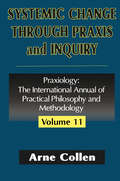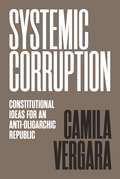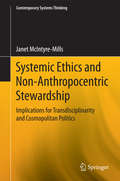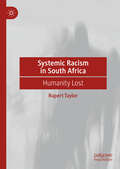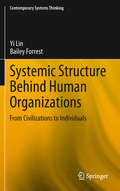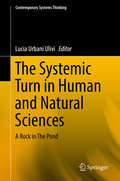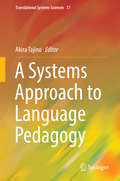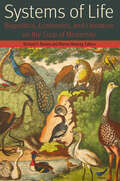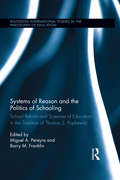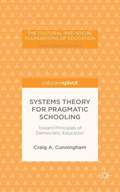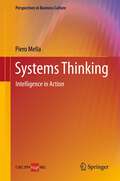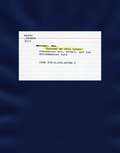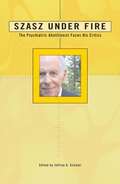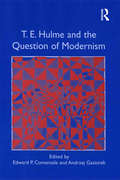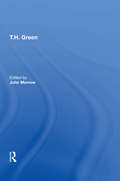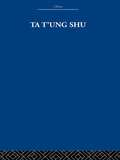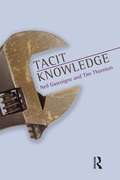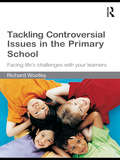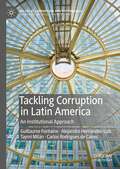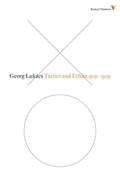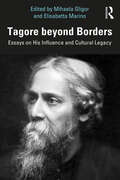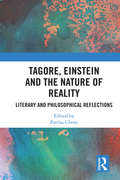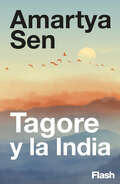- Table View
- List View
Systemic Change Through Praxis and Inquiry
by Arne CollenThis new volume in the distinguished Praxiology series examines the confluence of praxiology, pragmatics, and systemics in the study of systemic change through human inquiry, particularly small group activities, human organizations, and globalizing trends. It covers core concepts indigenous to organizational life. The author presents and subsequently integrates several conceptual schemes relevant to human beings and small groups engaged in human inquiry for systemic change in organizational settings.Each key concept in the volume is covered in a chapter theme that articulates the praxiology and pragmatics of human inquiry. Chapter 1 examines change as a systemic idea from a research methodologist's point of view. Chapter 2 articulates numerous points to distinguish systemic from non-systemic research methods to bring about systemic change. Chapter 3 discusses the prevalence of hierarchy and control. Chapter 4 focuses on "disciplinarity," viewed as one kind of quest for understanding complexity and change. Chapter 5 describes praxiology in inquiry. Chapter 6 elaborates on emergent forms of praxiology. Chapter 7 demonstrates the viability of systemic change through praxiology. Chapter 8 targets the general features of research process that are the means to effectuate systemic change, while Chapter 9 elaborates on these means toward developing systemic inquiry to systemic change. Chapter 10 discusses "complexification" in human inquiry and systemic change.Systemic Change Through Praxis and Inquiry is a pioneering effort to attain a more integrated view of research methodology for human inquiry. It will be of great interest to students of business, management, and organizational studies.Arne Collen is a long-standing member of both the Executive Faculty at Saybrook Graduate School in San Francisco and the Research and Teaching Adjunct Faculty in the California College of Organizational Studies and the California College of Professional Psychology of Alliant International University, San Francisco Bay Campus. He is a research methodologist, who, over the last three decades, has applied systemic and sociocybernetic perspectives to advances in research methodology for human inquiry. With Wojciech W. Gasparski, he is co-editor of Design and Systems, Volume 3 of the Praxiology series.
Systemic Cognition and Education: Empowering Students for Excellence in Life
by Ibrahim A. HallounThis book offers pedagogic and governance foundations and guidelines for systemic education. It provides an overall systems-based picture of what formal education should be about, and of how things should be carried out in practice, in order to empower students – and teachers – for success in life. It transcends traditional disciplinary education, showing how systemic, praxis immersive, convergence education (SPICE) produces graduates who know how to think outside the box and excel in practical real-life situations. Drawing on philosophy, cognition, and the latest developments in neuroscience, the book calls for systemic pedagogical frameworks that allow for different curricula to be coherently and efficiently designed, and consistently and systematically deployed across different disciplines and various grade levels in the context of mind-and-brain based experiential learning ecologies.This volume is a major design and practice reference for school teachers, university professors, graduate students, along with interested educators, educationists, and stakeholders in various sectors of society.
Systemic Corruption: Constitutional Ideas for an Anti-Oligarchic Republic
by Camila VergaraA bold new approach to combatting the inherent corruption of representative democracyThis provocative book reveals how the majority of modern liberal democracies have become increasingly oligarchic, suffering from a form of structural political decay first conceptualized by ancient philosophers. Systemic Corruption argues that the problem cannot be blamed on the actions of corrupt politicians but is built into the very fabric of our representative systems.Camila Vergara provides a compelling and original genealogy of political corruption from ancient to modern thought, and shows how representative democracy was designed to protect the interests of the already rich and powerful to the detriment of the majority. Unable to contain the unrelenting force of oligarchy, especially after experimenting with neoliberal policies, most democracies have been corrupted into oligarchic democracies. Vergara explains how to reverse this corrupting trajectory by establishing a new counterpower strong enough to control the ruling elites. Building on the anti-oligarchic institutional innovations proposed by plebeian philosophers, she rethinks the republic as a mixed order in which popular power is institutionalized to check the power of oligarchy. Vergara demonstrates how a plebeian republic would establish a network of local assemblies with the power to push for reform from the grassroots, independent of political parties and representative government.Drawing on neglected insights from Niccolò Machiavelli, Nicolas de Condorcet, Rosa Luxemburg, and Hannah Arendt, Systemic Corruption proposes to reverse the decay of democracy with the establishment of anti-oligarchic institutions through which common people can collectively resist the domination of the few.
Systemic Ethics and Non-Anthropocentric Stewardship
by Janet Mcintyre-MillsThis book makes a case for rights and responsibilities to be expressed through a cosmopolitan praxis based on developing strong cosmopolitan approaches. This developed approach respects a form of cultural or national identity that is not at the expense of others, the environment or future generations. This new stoicism is based on a sense of responsibility for others. The book also explores systemic ethical praxis in response to the vexed challenge of how to bridge the false dualism of pitting the environment versus profit Systemic Ethics and Non-Anthropocentric Stewardship: Implications for Transdisciplinarity and Cosmopolitan Politics is organized into seven chapters. The book begins by providing readers with an understanding of the way in which cosmopolitanism (like all social concepts) is shaped by diverse definitions and applied differently by theorists and those that engage in transformative praxis. It also develops an argument based on considering the empirical consequences of social, economic and environmental decisions on the quality of life of current and future generations. The next chapter critiques anthropocentricism and explores how policy makers develop agreements on what constitutes and supports the wellbeing of the planet rather than the GDP. The book then explores the options for social democracy and ways to enhance an ethical approach to post national governance and argues for participatory democracy and governance to respond to diversity within and across national boundaries. The following chapters reflect upon the author's own participatory action research process and examines the transformations that can arise through critical systemic thinking and practice. Next the book makes the case for systemic ethical governance that is able to manage consumption, before concluding with a final look at the book's approach, based on critical heuristics.
Systemic Racism in South Africa: Humanity Lost
by Rupert TaylorThis book takes a critical macro-level political sociological perspective to understanding South African politics and society. Applying systemic racism theory to South Africa, the author argues that South African society through its exclusionary social mechanisms has assumed a systemically racist form that deeply compromises questions of truth and justice. Constitutive of, and embedded in, the structure of South African society, racism has a reach and a durability that runs deep through the successive stages of segregationism, apartheid, and liberal democracy. Showing the limits of the rule of law in a racist society, the author offers a theoretically-informed interpretation as to why the national liberation struggle has fallen short of its promise to deliver a &“better life for all,&” and as to why truth and justice remain so deeply compromised in South Africa today. The arguments advanced are supported by over thirty semi-structured interviews conducted by the author with high-profile South African politicians, jurists, and intellectuals; as well as by using Truth and Reconciliation Commission hearing transcripts – both public and &“top-secret.&” This thought-provoking book is driven by the imperative to offer a compelling and sustained argument for taking a systemic racism approach to interpreting South Africa for scholars and students of sociology, political science, race and ethnic studies, law, and South African history.
Systemic Structure Behind Human Organizations
by Bailey Forrest Yi LinSystemic Structure behind Human Organizations: From Civilizations to Individuals shows how the systemic yoyo model can be successfully employed to study human organizations at three different levels: civilizations, business enterprises, and individuals. This monograph tackles managerial problems from an holistic perspective such as how a business entity grows and dies and how a CEO can manipulate the choices of long- and short-term projects in order to gain more control over the board of directors. By creating a uniform language and logic of reasoning, the book provides examples and convincing results. Additionally the book shows how the same model, thinking logic, and methodology of the systems research can be equally applied to analyze problems and situations considered in natural sciences, social sciences, and humanity areas. Therefore it offers knowledge of a brand new tool to attack organizational problems. By concentrating on difficult, unsettled issues in these varying areas, this monograph thoroughly explains how some laws of nature can be established for the common study of natural and social sciences.
The Systemic Turn in Human and Natural Sciences: A Rock In The Pond (Contemporary Systems Thinking)
by Lucia Urbani UliviThis book is dedicated to the consolidation and to the expansion of theoretic systems thinking as a necessary integration of the general reductionist and analytical attitude dominant in our culture. Reductionism and analytical approaches have produced significant results in many fields of contemporary knowledge giving a great contribution to relevant scientific discoveries and to their technological application, but their validity has been improperly universalized as the only and best methods of knowledge in every domain. It is nowadays clear that analytical or mereological approaches are inadequate to solve many problems and that we should introduce – or support the diffusion of - new concepts and different research attitudes.A good candidate to support such a shift is the well known theoretical approach based on the concept of “system” that no more considers the elementary constituents of an object, but the entity emerging from the relations and interactions among its elementary parts. It becomes possible to reconstruct several domains, both philosophical and scientific, from the systemic point of view, introducing fresh ideas in the research in view of a general rational vision of the world on more comprehensive basis.This book contributes to the diffusion and evolution of systemic thinking by focusing on two main objectives: developing and updating the systemic approach in disciplines currently using it and introducing the systemic perspective in humanistic disciplines, where the approach is not widely used. The Systemic Turn in Human and Natural Sciences: A Rock in the Pond is comprised of ten chapters. The chapter authors adopt a trans-disciplinary perspective, consisting in the recognition and harmonization of the special outlooks that together, within the general systemic paradigm, gives an ideal unity to the book.
A Systems Approach to Language Pedagogy (Translational Systems Sciences #17)
by Akira TajinoThis volume represents the first attempt in the field of language pedagogy to apply a systems approach to issues in English language education. In the literature of language education, or more specifically, second or foreign language learning and teaching, each topic or issue has often been dealt with independently, and been treated as an isolated item. Taking grammar instruction as an example, grammatical items are often taught in a sequential, step-by-step manner; there has been no “road map” in which the interrelations between the various items are demonstrated. This may be one factor that makes it more difficult for students to learn the language organically. The topics covered in this volume, including language acquisition, pedagogical grammar, and teacher collaboration, are viewed from a holistic perspective. In other words, language pedagogy is approached as a dynamic system of interrelations. In this way, “emergent properties” are expected to manifest. This book is recommended for anyone involved in language pedagogy, including researchers, teachers, and teacher trainers, as well as learners.
Systems of Life: Biopolitics, Economics, and Literature on the Cusp of Modernity (Forms of Living)
by Richard A. Barney and Warren MontagSystems of Life offers a wide-ranging revaluation of the emergence of biopolitics in Europe from the mid– eighteenth to the mid–nineteenth century. In staging an encounter among literature, political economy, and the still emergent sciences of life in that historical moment, the essays collected here reopen the question of how concepts of animal, vegetable, and human life, among other biological registers, had an impact on the Enlightenment project of thinking politics and economics as a joint enterprise. The volume’s contributors consider politics, economics, and the biological as distinct, semi-autonomous spheres whose various combinations required inventive, sometimes incomplete, acts of conceptual mediation, philosophical negotiation, disciplinary intervention, or aesthetic representation.
Systems of Reason and the Politics of Schooling: School Reform and Sciences of Education in the Tradition of Thomas S. Popkewitz (Routledge International Studies in the Philosophy of Education)
by Miguel A. Pereyra Barry M. FranklinThe 1980s were an important decade for educational inquiry. It was the moment of the “linguistic turn,” with its emphasis on the role of language as a constructor of reality, a structuring agent for institutions such as schools, and a medium for translating knowledge into elements of power for processes of social regulation. Drawing on the work and insights of educational researcher Thomas S. Popkewitz, this book shows how the linguistic turn provided an alternative to both mainline educational research grounded in the ideals of political liberalism and the effort of neo-Marxists to challenge liberal thinking in favor of a scholarship based on class conflict and economic determinism.
Systems Theory for Pragmatic Schooling: Toward Principles of Democratic Education
by Craig A. CunninghamWriting for educators and education leaders, Cunningham shows that combining a philosophy of pragmatism with thinking about education as systems can illuminate challenges in contemporary schooling and provide practical solutions for creating a democratic education.
Systems Thinking: Intelligence in Action
by Piero MellaThe core belief underlying this book is that the most useful and effective models to strengthen our intelligence are system ones, developed following the logic of Systems Thinking. Such models can explore complexity, dynamics, and change, and it is the author's view that intelligence depends on the ability to construct models of this nature. The book is designed to allow the reader not only to acquire simple information on Systems Thinking but above all to gradually learn the logic and techniques that make this way of thinking an instrument for the improvement of intelligence. In order to aid the learning and practice of the Systems Thinking discipline, the author has abandoned a rigid formal language for a more discursive style. He writes in the first person, with an ample number of citations and critical analyses, and without ever giving in to the temptation to use formal mathematics.
The Systems View of Life
by Pier Luigi Luisi Fritjof CapraOver the past thirty years, a new systemic conception of life has emerged at the forefront of science. New emphasis has been given to complexity, networks, and patterns of organisation leading to a novel kind of 'systemic' thinking. This volume integrates the ideas, models, and theories underlying the systems view of life into a single coherent framework. Taking a broad sweep through history and across scientific disciplines, the authors examine the appearance of key concepts such as autopoiesis, dissipative structures, social networks, and a systemic understanding of evolution. The implications of the systems view of life for health care, management, and our global ecological and economic crises are also discussed. Written primarily for undergraduates, it is also essential reading for graduate students and researchers interested in understanding the new systemic conception of life and its implications for a broad range of professions - from economics and politics to medicine, psychology and law.
Systems We Have Loved: Conceptual Art, Affect, and the Antihumanist Turn
by Eve MeltzerBy the early 1960s, theorists like Levi-Strauss, Lacan, Foucault, and Barthes had created a world ruled by signifying structures and pictured through the grids of language, information, and systems. Artists soon followed, turning to language and its related forms to devise a new, conceptual approach to art making. Examining the ways in which artists shared the structuralist devotion to systems of many sorts, "Systems We Have Loved" shows that even as structuralism encouraged the advent of conceptual art, it also raised intractable problems that artists were forced to confront. Considering such notable art figures as Mary Kelly, Robert Morris, Robert Smithson, and Rosalind Krauss, Eve Meltzer argues that during this period the visual arts depicted and tested the far-reaching claims about subjectivity espoused by theorists. She offers a new way of framing two of the twentieth century s most transformative movements one artistic, one expansively theoretical and she reveals their shared dream or nightmare of the world as a system of signs. By endorsing this view, Meltzer proposes, these artists drew attention to the fictions and limitations of this dream, even as they risked getting caught in the very systems they had adopted. The first book to describe art s embrace of the world as an information system, "Systems We Have Loved" breathes new life into the study of conceptual art. "
Szasz Under Fire: A Psychiatric Abolitionist Faces His Critics
by Ph.D. Jeffrey A. SchalerSince he published The Myth of Mental Illness in 1961, professor of psychiatry Thomas Szasz has been the scourge of the psychiatric establishment.<P><P> In dozens of books and articles, he has argued passionately and knowledgeably against compulsory commitment of the mentally ill, against the war on drugs, against the insanity defense in criminal trials, against the "diseasing" of voluntary humanpractices such as addiction and homosexual behavior, against the drugging of schoolchildren with Ritalin, and for the right to suicide. Most controversial of all has been his denial that "mental illness" is a literal disease, treatable by medical practitioners.In Szasz Under Fire, psychologists, psychiatrists, and other leading experts who disagree with Szasz on specific issues explain the reasons, with no holds barred, and Szasz replies cogently and pungently to each of them. Topics debated include the nature of mental illness, the right to suicide, the insanity defense, the use and abuse of drugs, and the responsibilities of psychiatrists and therapists. These exchanges are preceded by Szasz's autobiography and followed by a bibliography of his works.
T.E. Hulme and the Question of Modernism
by Andrzej GasiorekThough only 34 years old at the time of his death in 1917, T.E. Hulme had already taken his place at the center of pre-war London's advanced intellectual circles. His work as poet, critic, philosopher, aesthetician, and political theorist helped define several major aesthetic and political movements, including imagism and Vorticism. Despite his influence, however, the man T.S. Eliot described as 'classical, reactionary, and revolutionary' has until very recently been neglected by scholars, and T.E. Hulme and the Question of Modernism is the first essay collection to offer an in-depth exploration of Hulme's thought. While each essay highlights a different aspect of Hulme's work on the overlapping discourses of aesthetics, politics, and philosophy, taken together they demonstrate a shared belief in Hulme's decisive importance to the emergence of modernism and to the many categories that still govern our thinking about it. In addition to the editors, contributors include Todd Avery, Rebecca Beasley, C.D. Blanton, Helen Carr, Paul Edwards, Lee Garver, Jesse Matz, Alan Munton, and Andrew Thacker.
T.H. Green (International Library Of Essays In The History Of Social And Political Thought)
by John MorrowThis volume collects a range of the most important published critical essays on T.H. Green's political philosophy. These essays consider Green's ethical and political philosophy, his accounts of freedom, rights, political obligation and property and the location of his political theory in the discourses of Victorian liberalism. It concludes with a selection of essays that provide comparative discussions of aspects of Green's political philosophy with positions advanced by Sidgwick, Rousseau, Kant and Hegel, and with both conservative and liberal responses to his ideas that emerged in late nineteenth and early twentieth century Japan.
Ta t'ung Shu: The One-World Philosophy of K'ang Yu-wei
by Laurence G. ThompsonFirst published in 1958.This volume translates one of the major works of modern Chinese philosophy and in so doing makes a major contribution to the study of comparative philosophy. The volume contains an extensive introduction structured as follows: 1. Biographical Sketch of K'ang Yu-wei2. Ta T'ung Shu: The Book3. A General Discussion of the One-W
Tacit Knowledge
by Neil Gascoigne Tim ThorntonTacit knowledge is the form of implicit knowledge that we rely on for learning. It is invoked in a wide range of intellectual inquiries, from traditional academic subjects to more pragmatically orientated investigations into the nature and transmission of skills and expertise. Notwithstanding its apparent pervasiveness, the notion of tacit knowledge is a complex and puzzling one. What is its status as knowledge? What is its relation to explicit knowledge? What does it mean to say that knowledge is tacit? Can it be measured? Recent years have seen a growing interest from philosophers in understanding the nature of tacit knowledge. Philosophers of science have discussed its role in scientific problem-solving; philosophers of language have been concerned with the speaker's relation to grammatical theories; and phenomenologists have attempted to describe the relation of explicit theoretical knowledge to a background understanding of matters that are taken for granted. This book seeks to bring a unity to these diverse philosophical discussions by clarifying their conceptual underpinnings. In addition the book advances a specific account of tacit knowledge that elucidates the importance of the concept for understanding the character of human cognition, and demonstrates the relevance of the recommended account to those concerned with the communication of expertise. The book will be of interest to philosophers of language, epistemologists, cognitive psychologists and students of theoretical linguistics.
Tackling Controversial Issues in the Primary School: Facing Life's Challenges with Your Learners
by Richard WoolleyHow do you broach family values with seven year olds? Can you help young children understand racism? Can you avoid bringing your own prejudices into the classroom? Talking effectively about controversial issues with young children is a challenge facing every primary school teacher. Tackling Controversial Issues in the Primary School provides teachers with support and guidance as you engage with the more tricky questions and topics you and your pupils encounter. Illuminated with case studies and examples of how teachers and children have confronted issues together, this book helps you understand your own perspectives and provides fresh approaches for the primary classroom. It considers how best to work with parents and carers, whole-school policies for tackling issues, and ideas for circle time, setting up international links, school councils and buddying systems. The range of challenging topics covered includes: family values racism in mono and multi-cultural settings democracy and citizenship the environment and sustainability consumerism, finances and media advertising gender, health and identity grief and loss. For all student and practising primary teachers, Tackling Controversial Issues in the Primary School provides much needed support as you help your learners face complicated ideas, find their voice and get involved in the issues that they feel make a difference.
Tackling Corruption in Latin America: An Institutional Approach (Political Corruption and Governance)
by Guillaume Fontaine Alejandro Hernández-Luis Taymi Milán Carlos Rodrigues de CairesThis book examines anti-corruption policies in Latin America. It compares best practices in public procurement and state budgets in order to provide new insights into policy design for governments, civil society organisations and international organisations engaged in the fight against corruption. The book assesses how a paradigm shift toward transparency in global governance has led to major changes in public policies in the region since the late 1990s. Using Uruguay and Chile as case studies, it then demonstrates the causal mechanisms linking transparency institutionalisation to corruption control. The book also offers recommendations for research and practice about the importance of coherent public accountability systems, that combine citizen oversight over government with government responsibility towards non-state actors. It will appeal to scholars and students of public policy, public administration and governance in Latin America, as well as those interested in political corruption.
Tactics and Ethics
by Georg LukacsTactics and Ethics collects Georg Lukács's articles from the most politically active time of his life, a period encompassing his stint as deputy commissar of education in the Hungarian Soviet Republic. Including his famed essay on parliamentarianism--which earned Lukács the respectful yet severe criticism of Lenin--this book is a treasure chest of valuable insights from one of history's great political philosophers.
Tagore beyond Borders: Essays on His Influence and Cultural Legacy
by Mihaela Gligor Elisabetta MarinoThis book looks at Rabindranath Tagore’s creative art, social commitment, literary and artistic representation and his unique legacy in the cultural history of modern India – as a blend of the quintessentially Indian and the liberal universalist. Tagore’s genius, which he expressed through his poetry, songs, paintings, drama and philosophy, is celebrated across the globe. In 1913, he was awarded the Nobel Prize for Literature for his volume of poetry, Gitanjali (Song Offerings), making him the first Nobel laureate from Asia. This volume of essays celebrates his intellectual engagements and his incredible legacy by discussing the diverse ways in which his works have been reinterpreted, adapted and translated over the years. It analyses his perspectives on modernity, nationalism, liberation, education, post-colonialism and translatability and their relevance today. The leitmotif is a Tagore who, while imaginable as made possible only within the Indian tradition, eludes attempts aimed at identification with a national culture and remains a "cosmopolitan" in the best sense of the term.This volume will be of interest to readers and researchers in the fields of literature, philosophy, political science, cultural studies, Asian studies, South Asian studies and Tagore studies. Fans of Tagore will also find this an interesting read as it presents many little knows aspects of the poet’s work.
Tagore, Einstein and the Nature of Reality: Literary and Philosophical Reflections (Routledge Studies In The Philosophy Of Mathematics And Physics Ser.)
by Partha GhoseThis volume consists of a selection of scholarly essays from literature, philosophy and history on the conception of reality as understood by Rabindranath Tagore and Albert Einstein. The nature of reality has been a long-debated issue among scientists and philosophers. Tagore (1861–1941) met Einstein (1879–1955) at the latter’s house in Kaputh, Germany on 14 July 1930 and had a long conversation on this issue. This conversation has been widely quoted and discussed by scientists, philosophers and scholars from the literary world. The important question that Tagore and Einstein discussed was whether the world is a unity dependent on humanity, or the world is a reality independent of the human factor. Einstein believed that reality is independent of the mind and the human factor. On the other hand, Tagore adopted the opposite view. Nevertheless, both Einstein and Tagore claimed to be realists — their conceptions of reality were obviously fundamentally different. Where does the difference lie? Can it be harmonized at a deeper level? This volume brings together for the first time a gamut of views on this subject from eminent scholars. It presents some key reflections on reality, language, poetry, truth, science, personality, human sciences, virtue ethics, intelligibility and creativity. It will be useful to scholars and researchers of philosophy, literature, history and political studies, as also to those interested in Tagore.
Tagore y la India
by Amartya SenUna apasionante semblanza del Premio Nobel de Literatura más desconocido. Premio Princesa de Asturias de las Ciencias Sociales 2021 Premio Nobel de Economía 1998 Existe un auténtico contraste entre la presencia intelectual de Rabindranath Tagore en la literatura, la política y la sociedad bengalíes y su imagen de gurú espiritual que llegó hasta Occidente. Entre ambas facetas se abre un amplio espacio surcado por numerosos debates en torno a la religiosidad, el sistema de castas y la independencia que llevaron a considerarlo en India una de las personalidades más polifacéticas y preeminentes del siglo XXI. Amartya Sen recorre en esta breve semblanza las piedras angulares del argumentario del pensador bengalí, un escritor de elegante prosa y mágica poesía, y redescubre a los lectores occidentales al Tagore más oculto: el concienciado activista, el pintor de enorme talento y el gran estratega político. «Rabindranath sabía que no habría podido brindarle a la India el liderazgo político que Gandhi le confirió, y nunca hubo ironía en su reconocimiento de lo que Gandhi hizo por la nación (de hecho, fue Tagore quien popularizó el tratamiento de Mahatma —alma grande— para Gandhi)».
